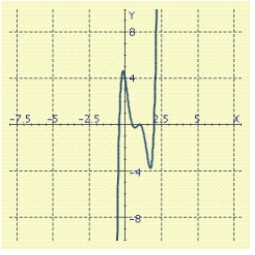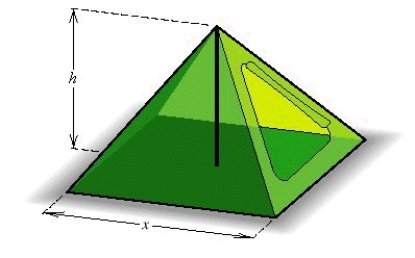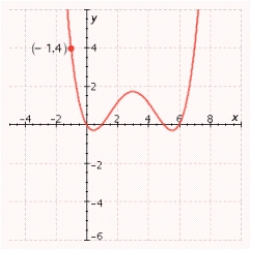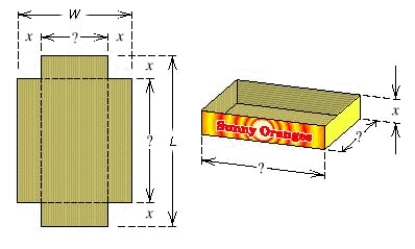Deck 3: Polynomial and Rational Functions
سؤال
سؤال
سؤال
سؤال
سؤال
سؤال
سؤال
سؤال
سؤال
سؤال
سؤال
سؤال
سؤال
سؤال
سؤال
سؤال
سؤال
سؤال
سؤال
سؤال
سؤال
سؤال
سؤال
سؤال

فتح الحزمة
قم بالتسجيل لفتح البطاقات في هذه المجموعة!
Unlock Deck
Unlock Deck
1/24
العب
ملء الشاشة (f)
Deck 3: Polynomial and Rational Functions
1
Find the quotient and remainder if is divided by
A)
B)
C)
D) Quotient:0
E)
A)
B)
C)
D) Quotient:0
E)
Quotient:0
2
Find a factored form with integer coefficients of the polynomial f shown in the figure. 

A)
B)
C)
D)
E)


A)

B)

C)

D)

E)

D
3
The density D(h) (in kg/m 3 ) of the earth's atmosphere at an altitude of h meters can be approximated by  where
where  and
and  . Use a graphing utility to graph D and approximate the altitude h at which the density is 0.3.
. Use a graphing utility to graph D and approximate the altitude h at which the density is 0.3.
A) 12,400 m
B) 12,600 m
C) 12,000 m
D) 12,800 m
E) 12,200 m
 where
where  and
and  . Use a graphing utility to graph D and approximate the altitude h at which the density is 0.3.
. Use a graphing utility to graph D and approximate the altitude h at which the density is 0.3.A) 12,400 m
B) 12,600 m
C) 12,000 m
D) 12,800 m
E) 12,200 m
A
4
A polynomial f ( x ) with real coefficients and leading coefficient 1 has the given zero and degree. Express f ( x ) as a product of linear and quadratic polynomials with real coefficients that are irreducible over R. 
A)
B)
C)
D)
E)

A)

B)

C)

D)

E)


فتح الحزمة
افتح القفل للوصول البطاقات البالغ عددها 24 في هذه المجموعة.
فتح الحزمة
k this deck
5
Find all solutions of the equation. 
A)
B)
C)
D)
E)

A)

B)

C)

D)

E)


فتح الحزمة
افتح القفل للوصول البطاقات البالغ عددها 24 في هذه المجموعة.
فتح الحزمة
k this deck
6
Find all values of  such that
such that 
 .
.
A)
B)
C)
D)
E)
 such that
such that 
 .
.A)

B)

C)

D)

E)


فتح الحزمة
افتح القفل للوصول البطاقات البالغ عددها 24 في هذه المجموعة.
فتح الحزمة
k this deck
7
Use synthetic division to decide whether  is a zero of
is a zero of  .
.  ;
; 
A) x - c is a zero
B) x - c is not a zero
 is a zero of
is a zero of  .
.  ;
; 
A) x - c is a zero
B) x - c is not a zero

فتح الحزمة
افتح القفل للوصول البطاقات البالغ عددها 24 في هذه المجموعة.
فتح الحزمة
k this deck
8
A canvas camping tent is to be constructed in the shape of a pyramid with a square base. An 8-foot pole will form the center support, as illustrated in the figure. Find the length x of a side of the base so that the total amount of canvas needed for the sides and bottom is 384 ft 2 . 
A) 13 ft
B) 10 ft
C) 12 ft
D) 11 ft
E) 14 ft

A) 13 ft
B) 10 ft
C) 12 ft
D) 11 ft
E) 14 ft

فتح الحزمة
افتح القفل للوصول البطاقات البالغ عددها 24 في هذه المجموعة.
فتح الحزمة
k this deck
9
Find a polynomial of degree that has the indicated zeros and satisfies the given condition.
A)
B)
C)
D)
E)
A)
B)
C)
D)
E)

فتح الحزمة
افتح القفل للوصول البطاقات البالغ عددها 24 في هذه المجموعة.
فتح الحزمة
k this deck
10
Find the domain  of
of  .
. 
A)
B)
C)
D)
E)
 of
of  .
. 
A)

B)

C)

D)

E)


فتح الحزمة
افتح القفل للوصول البطاقات البالغ عددها 24 في هذه المجموعة.
فتح الحزمة
k this deck
11
Applying the first theorem on bounds for real zeros of polynomials, determine the smallest and largest integers that are upper and lower bounds, respectively, for the real solutions of the equation. With the aid of a graphing utility, discuss the validity of the bounds. 
A) The upper bound is , the lower bound is
, the lower bound is  .
.
B) The upper bound is , the lower bound is
, the lower bound is  .
.
C) The upper bound is , the lower bound is
, the lower bound is  .
.
D) The upper bound is , the lower bound is
, the lower bound is  .
.
E) The upper bound is , the lower bound is
, the lower bound is  .
.

A) The upper bound is
 , the lower bound is
, the lower bound is  .
.B) The upper bound is
 , the lower bound is
, the lower bound is  .
.C) The upper bound is
 , the lower bound is
, the lower bound is  .
.D) The upper bound is
 , the lower bound is
, the lower bound is  .
.E) The upper bound is
 , the lower bound is
, the lower bound is  .
.
فتح الحزمة
افتح القفل للوصول البطاقات البالغ عددها 24 في هذه المجموعة.
فتح الحزمة
k this deck
12
Express the statement as a formula that involves the variables w, z, u and a constant of proportionality k, and then determine the value of k from the condition : w varies directly as z and inversely as the square root of u, if z = 3 and u = 4, then w = 18
A)
B)
C)
D)
E)
A)

B)

C)

D)

E)


فتح الحزمة
افتح القفل للوصول البطاقات البالغ عددها 24 في هذه المجموعة.
فتح الحزمة
k this deck
13
Find the fourth-degree polynomial function whose graph is shown in the figure. 
A)
B)
C)
D)
E)

A)

B)

C)

D)

E)


فتح الحزمة
افتح القفل للوصول البطاقات البالغ عددها 24 في هذه المجموعة.
فتح الحزمة
k this deck
14
Use synthetic division to decide whether  is a zero of the equation.
is a zero of the equation.  ;
; 
A) c is not a zero
B) c is a zero
 is a zero of the equation.
is a zero of the equation.  ;
; 
A) c is not a zero
B) c is a zero

فتح الحزمة
افتح القفل للوصول البطاقات البالغ عددها 24 في هذه المجموعة.
فتح الحزمة
k this deck
15
Find all values of  such that
such that 

A)
B)
C)
D)
E)
 such that
such that 

A)

B)

C)

D)

E)


فتح الحزمة
افتح القفل للوصول البطاقات البالغ عددها 24 في هذه المجموعة.
فتح الحزمة
k this deck
16
Use synthetic division to find 
 ;
; 
A) f ( 3 ) = 80
B) f ( 3 ) = 165
C) f ( 3 ) = 189
D) f ( 3 ) = 170
E) f ( 3 ) = 5

 ;
; 
A) f ( 3 ) = 80
B) f ( 3 ) = 165
C) f ( 3 ) = 189
D) f ( 3 ) = 170
E) f ( 3 ) = 5

فتح الحزمة
افتح القفل للوصول البطاقات البالغ عددها 24 في هذه المجموعة.
فتح الحزمة
k this deck
17
Find all values of  such that
such that 

A)
B)
C)
D)
E)
 such that
such that 

A)

B)

C)

D)

E)


فتح الحزمة
افتح القفل للوصول البطاقات البالغ عددها 24 في هذه المجموعة.
فتح الحزمة
k this deck
18
From a rectangular piece of cardboard having dimensions W = 18 and L = 40 an open box is to be made by cutting out identical squares of area x 2 from each corner and turning up the sides (see Illustration). Find all positive values of x such that the volume of the box V ( x ) > 0. Include only allowable values of x in your answer. 
A)
B)
C)
D)
E)

A)

B)

C)

D)

E)


فتح الحزمة
افتح القفل للوصول البطاقات البالغ عددها 24 في هذه المجموعة.
فتح الحزمة
k this deck
19
A polynomial f ( x ) with real coefficients and leading coefficient 1 has the given zeros and degree. Express f ( x ) as a product of linear and quadratic polynomials with real coefficients that are irreducible over R. 
A)
B)
C)
D)
E)

A)

B)

C)

D)

E)


فتح الحزمة
افتح القفل للوصول البطاقات البالغ عددها 24 في هذه المجموعة.
فتح الحزمة
k this deck
20
Salt water of concentration 0.5 pound of salt per gallon flows into a large tank that initially contains 220 gallons of pure water. If the flow rate of salt water into the tank is 4 gal/min, find a formula for the salt concentration  (in lb/gal) after t minutes.
(in lb/gal) after t minutes.
A)
B)
C)
D)
E)
 (in lb/gal) after t minutes.
(in lb/gal) after t minutes.A)

B)

C)

D)

E)


فتح الحزمة
افتح القفل للوصول البطاقات البالغ عددها 24 في هذه المجموعة.
فتح الحزمة
k this deck
21
Express the statement as a formula that involves the variables q, x, y and a constant of proportionality k, and then determine the value of k from the condition : q is inversely proportional to the sum of x and y, if x = 2.5 and y = 3.6, then q = 3.8
A)
B)
C)
D)
E)
A)

B)

C)

D)

E)


فتح الحزمة
افتح القفل للوصول البطاقات البالغ عددها 24 في هذه المجموعة.
فتح الحزمة
k this deck
22
When uranium disintegrates into lead, one step in the process is the radioactive decay of radium into radon gas. Radon enters through the soil into home basements, where it presents a health hazard if inhaled. In the simplest case of radon detection, a sample of air with volume V is taken. After equilibrium has been established, the radioactive decay D of the radon gas is counted with efficiency E over time t. The radon concentration C present in the sample of air varies directly as the product of D and E and inversely as the product of V and t. For a fixed radon concentration C and time t, find the change in the radioactive decay count D if V is multiplied by 2 and E is reduced by 14%.
A) increases 1,428.57%
B) increases 281.40%
C) increases 255.81%
D) increases 175.44%
E) increases 232.56%
A) increases 1,428.57%
B) increases 281.40%
C) increases 255.81%
D) increases 175.44%
E) increases 232.56%

فتح الحزمة
افتح القفل للوصول البطاقات البالغ عددها 24 في هذه المجموعة.
فتح الحزمة
k this deck
23
The pressure P acting at a point in a liquid is directly proportional to the distance d from the surface of the liquid to the point. Express P as a function of d by means of a formula that involves a constant of proportionality k. In a certain oil tank, the pressure at a depth of 8 feet is 472. Find the value of k.
A)
B)
C)
D)
E)
A)
B)
C)
D)
E)

فتح الحزمة
افتح القفل للوصول البطاقات البالغ عددها 24 في هذه المجموعة.
فتح الحزمة
k this deck
24
Poiseuille's law states that the blood flow rate F ( in L/min ) through a major artery is directly proportional to the product of the fourth power of the radius r and the blood pressure P. During heavy exercise, normal blood flow rates sometimes triple. If the radius of a major artery increases by 7%, approximately how much harder must the heart pump?
A) about 1.31 times as hard
B) about 3.43 times as hard
C) about 2.29 times as hard
D) about 2.04 times as hard
E) about 1.92 times as hard
A) about 1.31 times as hard
B) about 3.43 times as hard
C) about 2.29 times as hard
D) about 2.04 times as hard
E) about 1.92 times as hard

فتح الحزمة
افتح القفل للوصول البطاقات البالغ عددها 24 في هذه المجموعة.
فتح الحزمة
k this deck








